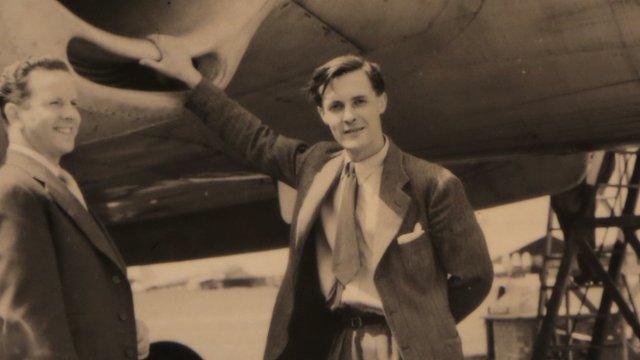De Havilland Museum unveiling marks Mosquito plane's 75th anniversary
- Published

The Mosquito prototype, pictured before its restoration was completed, has taken five years to refurbish
A restored prototype of a World War Two plane dubbed the "Wooden Wonder" has been unveiled exactly 75 years after it made its maiden flight.
The Mosquito plane was wheeled out of its hangar at The de Havilland Aircraft Museum in London Colney, Hertfordshire, at 14:45 GMT.
Geoffrey de Havilland Jnr, the son of the manufacturer, first flew the plane at that exact time on 25 November 1940.
Museum chairman Alan Brackley said the unveiling was a "wonderful day".
Scores of volunteers have spent five years working on the overhaul after an inspection revealed some areas of concern.
'Looks absolutely superb'
The plane, largely made from plywood and balsa, has been re-assembled and repainted in the same colours as when it was decommissioned by the RAF in 1943.
Designed and made on the site of the museum at Salisbury Hall, it made its maiden flight from de Havilland's factory hangar at Hatfield.
"It looks better than when it was rolled out of the hangar in 1940 - it looks absolutely superb," said Mr Brackley.
"I've been here since 1979. I started off as a volunteer and I helped look after the prototype and would wash it.
"The volunteers have worked for the love of it and when I came here I felt privileged to just be able to touch such an historic plane."
The prototype, number W4050, is said to have been the fastest of all Mosquitoes.
Used to test engines and not laden with the armoured plates of battle planes, it could fly at more than 400mph (644km).
The Mosquito was regarded as the most versatile war plane and was used for fighting, bombing, reconnaissance and pathfinder missions.
The test aircraft, which is no longer airworthy, has been on display since 1959 when former Royal Marine Major Walter Goldsmith bought Salisbury Hall.
- Published30 April 2015

- Published6 August 2014
